
Bluesky, the Twitter spinoff that was once billed as a kinder, gentler alternative to what is now known as X, probably isn't on death's door. But after a burst of growth around the election, it's shrinking and steadily declining in influence, even as other corners of the left thrive during Trump's second term.
The life and death of social media platforms are dictated by network effects. Although there can sometimes be inflection points, for the most part, their trajectory is predictable. You join them because other people are joining them, and that in turn makes them progressively more useful. And you remain on them out of habit until and unless a critical mass decamps for somewhere else.
Twitter/X has slowly declined in influence, according to external evidence — Elon Musk’s occasional claims to the contrary notwithstanding.1 And yet, despite some extremely problematic characteristics that we’ve documented at Silver Bulletin, X remains relatively sticky, partially because it’s been a slow glide down from a high peak following earlier years of exponential growth.
Alternatives like Meta’s Threads, Trump’s Truth Social and the independent Mastodon have failed to gain traction. And we’re at a point where it’s probably safe to assume that Bluesky won’t displace Twitter either.
Let’s take a look at Google searches related to each platform.2 By this measure, Bluesky peaked in November, 2024 following Trump’s reelection — although even then, despite largely glowing media coverage, it topped out at about 1/20th the worldwide search volume for X.
Even on a logarithmic scale — on a linear scale, the graph is boring, because everything but Twitter would pretty much just be a flat line — the gulf between X and the other platforms is clear. And since the election, Bluesky has lost ground. More precise data based on the number of unique “likers”, “posters” and “followers” at Bluesky tracks a similar curve, with an initial peak around the election and a secondary peak after Trump’s inauguration but persistent erosion since then. The number of unique posters at Bluesky peaked at just under 1.5 million on Nov. 18, 2024 but has since fallen to an average of about 660,000 on weekdays and 600,000 on weekends: in other words, a drop of more than half.
The decline in Bluesky’s number of unique daily followers is even more substantial. They topped out at 3.1 million on Nov. 18 last year, but are now just under 400,000 per day: almost a tenfold decline. So while a dedicated troupe of Bluesky regulars are still skeeting up a storm, they’re gaining less and less traction, preaching only to the converted.
Why this failure to achieve escape velocity? Well, as I’ve written about before, it might be Twitter itself was the outlier, created by tech nerds and for tech nerds at a time when the Internet was less tribal. Not only is anything else unlikely to supplant Twitter, but Twitter itself would probably fail to realize the same prominence if it were launched today, even if there were no dominant Twitter-like platform competing with it.
Founder effects are powerful in predicting network growth: if you go to a new club and everyone there has very peculiar tastes, it’s unlikely to become the hot new thing in town. Especially if everyone there is annoying and doesn’t seem to want you at their party in the first place.
Bluesky was initially popular with Twitter refugees who disliked Musk’s takeover of the platform, some of whom proclaimed that Elon had unleashed the “gates of hell” by restoring banned accounts or predicted that the platform would implode due to a shortage of engineering talent. I suppose I have no problem with this; ironically, the first post in Silver Bulletin history is entitled “In case Twitter goes to zero”. (I wanted a hedge in case it did, although if we’re being honest, I also had one eye out the door as ABC News was beginning to dismantle FiveThirtyEight.3) However, this also self-selected for a certain type of user, adherents of an attitude that I call “Blueskyism”.
Blueskyism should not be mistaken for general left-of-center political views. Google search traffic for Bluesky over the past year is highly correlated with Kamala Harris’s vote share, but has some other skews: controlling for the Harris vote, it’s (statistically) significantly higher in states with a large white population and where the percentage of people with advanced degrees is higher. Bluesky is disproportionately popular in D.C., but also in crunchy white states like Vermont and Oregon. Search traffic for Twitter/X over the same period shows the same bias toward highly educated states, but less toward Harris voters4 and actually an inverse correlation with the white population share. (X gets more search traffic in more diverse states.)
Demographics alone only go so far in explaining Blueskyism, however. It’s not a political movement so much as a tribal affiliation, a niche set of attitudes and style of discursive norms that almost seem designed in a lab to be as unappealing as possible to anyone outside the clique.
Blueskyism predates Bluesky
Although many people, myself included, find Twitter/X addicting — or not-so-secretly enjoy its drama — the most essential reason to stay there if you were some sort of professional journalist used to be to promote your work elsewhere at places where you might actually make a living from it. Under Elon’s leadership, that use case has been undermined as he’s made the platform more of a walled garden that throttles traffic to other places. (Substack in particular: The share of Silver Bulletin pageviews that originate from Twitter/X has steadily declined to around 2 percent.)
But if the benefit of tweeting all the time is less than it once was, so is the cost — at least for someone like me. That’s because some of the most annoying people on the platform have exited for Bluesky.
As compared to other people with a similar level of public prominence — so not heads-of-state or celebrities or NFL quarterbacks — I was a “trending topic” on Twitter as often as just about anyone for a period from roughly 2018-2021. Matt Yglesias and Maggie Haberman also come to mind as other people who share this particular “honor”, which is not a welcome one: it means you’re the main character of the day, the person that other people have decided to dogpile upon.5
There’s still some of this. If you tweet about election-related stuff, there is a pervasive tendency to “shoot the messenger” from partisans when the polls aren’t going their way. But much less than there once was: no more of the dogpiles for exceptionally strange reasons that I couldn’t even explain to my IRL friends.
And that’s because this behavior — I guess you could call it harassment but I’m a big boy and I can take it — consistently came from a relatively narrow group of power users, birds of a feather who flocked together, people who could demonstrate their fidelity to the group by picking on the main character. On Bluesky, exactly the same people — and I do mean exactly6 — attack exactly the same perpetual enemies, but to roughly 1/60th7 the size of the audience.
So I feel freer using Twitter these days for jokes, memes, and tongue-in-cheek ideas that aren’t meant to be taken entirely seriously, intended to be read as though they’re written in comic sans. Sometimes, the goal is to test the waters for potential newsletter topics, to see what sparks a reaction. But there’s usually some deeper thought behind them. This from the other day was one such example:
This tweet sparked a reaction; the term “Blueskyism” got picked up quite a bit.8 Everybody seemed to have some sense for what Blueskyism meant — except for the high priests of Blueskyism like this person, the podcaster and former Huffington Post reporter Michael Hobbes:
Even though it might be more fun to keep everyone guessing, I’ll explain in a moment what I view as the three essential characteristics of Blueskyism. But first, a little bit of a history lesson in recent online tribalism.
Although Bluesky isn’t very influential today, what I call Blueskyism has a longer history — and predates the platform. It once had a lot of purchase on Twitter at a moment when Twitter was more influential than it is now and often served as the “assignment editor” for the mainstream media.
Blueskyism’s peak actually came before Bluesky was a thing, in roughly 2019/2020. (You’ll notice that Blueskyists often have a lot of nostalgia for this period, the one and perhaps only time when they improbably became the prom king.) This timing coincided with the 2020 presidential primary, when there was a huge gap between the most prominent voices on Twitter and those of the actual Democratic base. The ultimate result was the rejection of various more “online” and left-wing candidates for the stodgy and more centrist Joe Biden, but choices made during period continued to cast a shadow on the 2024 campaign, particularly after Harris’s statements during that period were scrutinized once she took over for Biden.
However, this isn’t the standard claim that Democrats should move to the center. I think the preponderance of evidence suggests that moderation wins more often than not, but it’s complicated, and there can be exceptions. What really matters in elections is simply being popular and winning over new converts. Blueskyism, with its intolerance for dissent, is the opposite of that.
Because, yes, while this is personal for me, annoyingness matters in politics. Zohran Mamdani has deemphasized hot-button cultural issues for the cost of living and taken a more personable approach — scavenger hunts rather than struggle sessions — and he’s probably about to become the next mayor of New York.
Why Blueskyism once had such a foothold on Twitter is a complicated question. I wasn’t particularly impressed by the Twitter Files — I don’t think they demonstrated that pre-Elon leadership put a particularly heavy algorithmic finger on the scale. But Twitter is a platform designed for conflict, especially in the form of the quote-retweet, and Blueskyists love the drama. These pile-ons can also create an impression of false consensus. If you were a young journalist in your first year on the job, not having built up the audience to spin a failed “cancellation” attempt into a popular Substack, they had to have a chilling effect. The COVID pandemic further accentuated this by turning everyone “very online” out of necessity, giving the Blueskyists a sort of home-court advantage.
But as we’ve seen over the past few months, Blueskyist attitudes aren’t actually winning out in the “marketplace of ideas”, as some Blueskyists would like to think. If they were, it wouldn’t be the case that Bluesky is getting just 1/60th of X’s traffic.9
Even today, Blueskyism is not exclusively confined to Bluesky, any more than, say, Finnish culture is exclusively confined to Finland.10 There are still residual elements of it on X, sometimes on Substack Notes, and occasionally in real life, so some of my examples are drawn from those cases — although Bluesky of course presents a far greater concentration.
OK, then, now onto the main event: the three essential characteristics of Blueskyism.
The first essential characteristic: Smalltentism
Aggressive policing of dissent, particularly of people “just outside the circle” who might have broader credibility on the center-left. Censoriousness, often taking the form of moral micropanics that designate a rotating cast of opponents as the main characters of the day. Self-reinforcing belief in the righteousness of the clique, and conflation of its values with broader public sentiment among “the base”.
A healthy political movement, you’d think, would welcome people who agree with them on 70 percent of issues, particularly if it sees Trump as an existential threat to democracy and wants a broad coalition against him. Blueskyists do literally almost the exact opposite: their biggest enemies are people on the center-left like me and Yglesias and Ezra Klein. Or center-left media institutions like the New York Times, which are often viewed as more problematic than Fox News.
This aggressive policing of boundaries might at least have been tactically smart during the miraculous Blue Period when Twitter was afflicted with Blueskyism. Yglesias, say, is followed by a lot more Democratic staffers than Ben Shapiro or some actual conservative is.
But now that Blueskyism is losing the battle of ideas, it just draws the tent narrower and ensures that it will remain obscure. There’s nothing more Blueskyist than this, literally creating a “list of shame”11 of Bluesky posters who remain active on Twitter.
And sometimes, Blueskyists even make violent threats toward people who disagree with them. For instance, the journalist Billy Binion says he recently “logged onto Bluesky to find thousands of people screaming at me, many of whom were telling me to kill myself” after having posted that “billionaires should exist”. There’s some of that on every social media platform, unfortunately, and I’m not going to make assertions about the relative frequency on Bluesky without taking some more comprehensive approach to the question. It certainly shouldn’t have a reputation for civil discourse, however, and this may help to explain the high rate of exits from the platform.
The second essential characteristic: Credentialism
Appeals to authority, particularly academic authority. Centering of the suitability of the speaker based on his or her credentials and/or identity characteristics (standpoint epistemology) as opposed to the strength of his or her arguments, accompanied by the implicit presumption to claim to be speaking on behalf of the entire identity group.
Although Blueskyism is small, its practitioners mostly consist of people within the professional-managerial class: (over)educated blue-state liberals, perhaps people who have drawn the short straw of elite overproduction. You can see that in the demographic data, or in the attitude site management takes: the platform literally just banned people from Mississippi because of a dispute over age verification.
And Bluesky has become relatively popular among academics, which I regard as a problem on various levels. The Democratic Party has already forgotten how to talk to large groups of voters like young men, who have become considerably less likely to complete college than young women. Meanwhile, the experts have made a lot of mistakes, and sometimes the reason is because they’ve become self-serving in pursuit of social media validation or blinded by political partisanship. Increasingly often, I’ll see academics engage in incredibly sloppy argumentation and this seems to be correlated with recent exposure to Bluesky. Because Bluesky is so small, it has a highly specific signature. It’s like if you have some toxic persona on the periphery of your friend group; someone starts speaking in a particular way that you just know they recently hung out with George or Gina.
While academic credentials are one way to gain credibility under Blueskyism, they aren’t the only one. Even though the Google search data suggests that the platform is disproportionately white, an alternative is to claim to speak on behalf of a disadvantaged group. I swear to God, I’m not trying to make this about “wokeness” but there is overlap there.
Perhaps the most prominent example of Blueskyism creeping into real life is when a group of left-leaning public health professionals, who often took a bullying approach during Twitter’s Blue Period, went out of their way to rationalize mass protests after George Floyd was murdered in 2020. Personally, I think it was perfectly fine to join in on these protests; political expression is important (and these protests were usually outdoors and masked). But I also think a lot of other things, like sending your children to school or visiting your dying relatives in the hospital, would have risen to this threshold also, and this group specifically used their credentials to endorse the Floyd protests after having campaigned for those other activities to be prohibited.
Indeed, this controversy recently resurfaced on Bluesky. After Brian Schatz, the Democratic senator from Hawaii, wrote sympathetically in response to a Sean Trende12 tweet that recalled the hypocrisy of endorsing the protests, he and other “Dem elected/staff/consultants” were blamed on the platform for being “awash in right-wing brainrot.”
The third essential characteristic: Catastrophism
Humorless, scoldy neuroticism, often rationalized by the view that one must be on “war footing” because the world is self-evidently in crisis. Sublimation of personal anxiety as a substitute for political activism or material solutions to the crisis, with expressions of weariness and pessimism signaling virtue and/or savviness.
Although the first two characteristics already limit the appeal of Blueskyism, this makes it worse. Even people who might otherwise be sympathetic to Bluesky have noticed how impossible it is to get away with a joke on the platform, one of the things that X sometimes13 still has going for it. The Bernie-era, Chapo Trap House strain of left-wing discourse also at least had a caustic if sometimes juvenile humor streak. Blueskyism does not.
Instead, the prevailing Blueskyist attitude is often something like this — that we’re in the midst of a “late stage capitalist hellscape” and that you have to be “delusional” to have any amount of hope or optimism”:14
Most people outside of Bluesky don’t think like this. Although literally almost zero Democrats are happy with the state of the country, overwhelming majorities of Americans are happy with how their personal lives are going and are able to compartmentalize politics away or recognize that other things matter in life, too.
Any sort of subculture, of course, attracts people who are looking to fit in somewhere. Blueskyism is hardly alone in this.15 Still, a subculture like Blueskyism that sees depression as a rational and even virtuous response is going to select for a lot of miserable people.16 And misery likes company. So the Blueskyists gather in a corner, exchanging tales of woe, while the rest of us slink away.
Still, I don’t expect the decline in usage of the platform to continue indefinitely. Bluesky will probably settle into a small but sustainable steady state as the equivalent of a niche hobbyist subreddit: a peculiar online neighborhood that someone wouldn't encounter unless she takes a wrong turn, its facades gradually decaying into disrepair as its residents leer at passersby from their lawn chairs.
Though the trend predates his purchase of the platform in 2022.
The search data tracks the platform since they were made widely publicly available; in Bluesky’s case, this was late 2022.
Such as not replacing jobs when there was attrition; the first big wave of layoffs was no surprise. Nor was it a surprise when ABC News shut down the rest of the site earlier this year.
For what it’s worth, if you run a regression analysis, the relationship with the Harris voting share on X disappears once you control for these other factors.
It didn’t actually take that much to become a trending topic: my impression is that the Twitter algo looked for mentions relative to some baseline. So if you were a trending topic, it didn’t mean people were tweeting about you more than they were about, say, Donald Trump, but rather that you were being mentioned more than you usually were.
It’s uncanny how predictably a certain type of Twitter poster became a prominent personality on Bluesky.
In recent months, Google search traffic for Twitter/X outpaces that for Bluesky by a ratio of about 60:1.
I don’t post or lurk on Bluesky, but I was told by a friend who does that it had “touched a nerve” there too, as I’d expect.
For another scale comparison: no Bluesky account has more followers than I still have on Twitter.
I just spent a week in Helsinki, so you might see a lot of references to the Nordic countries in upcoming newsletters.
You know who else created lists?
Of RealClearPolitics; Sean and I are friendly.
Although I’m not a fan of Elon’s humor.
This particular example comes from Twitter. But Lorenz, like Hobbes, is a high priest of Blueskyism and she remains active on both platforms.
To take a different “very online” subculture I’m more sympathetic toward, see this Asterisk Magazine article on rationalism and the types of people it attracts.
This is another reason that Blueskyism might have gained traction during the pandemic, which did make a lot of people miserable.



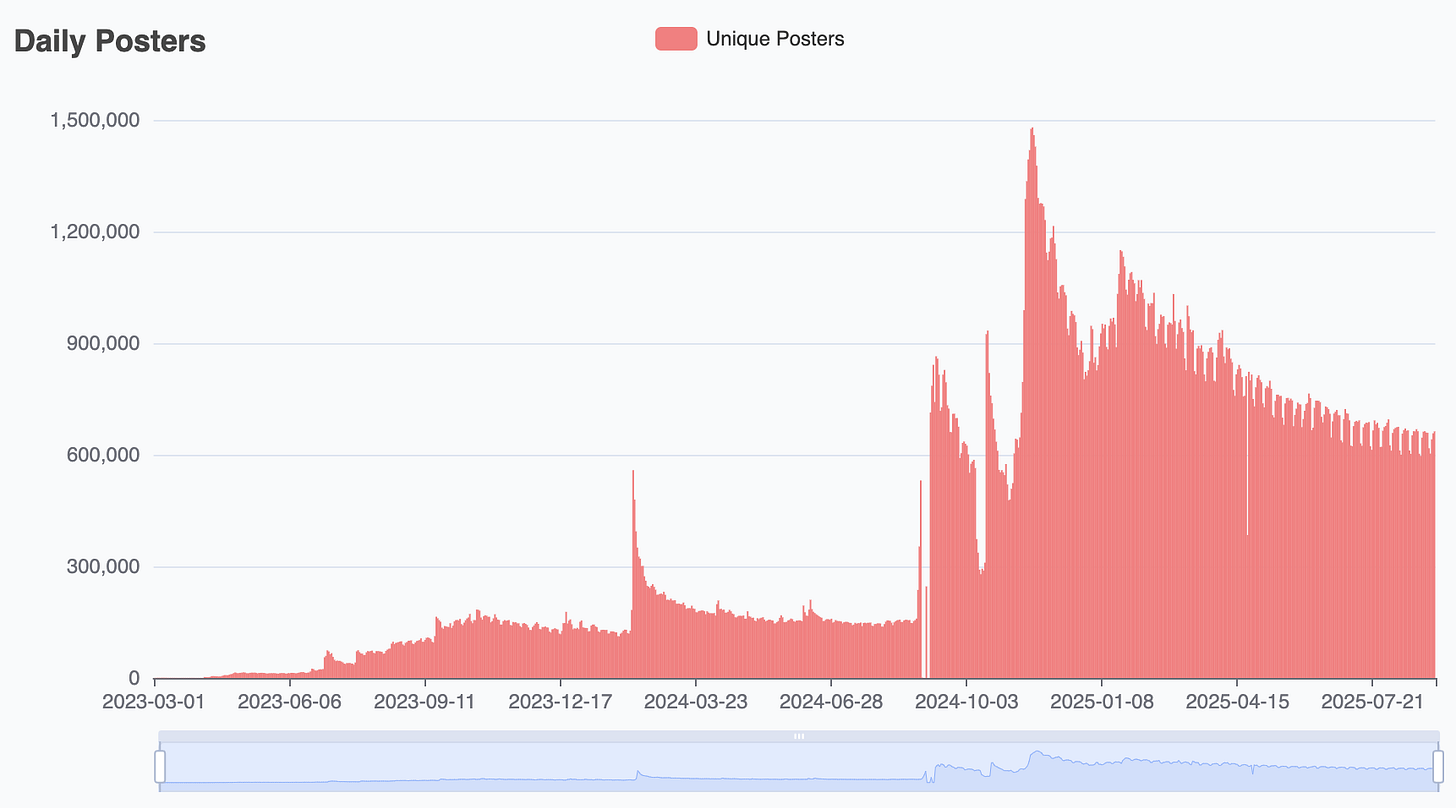
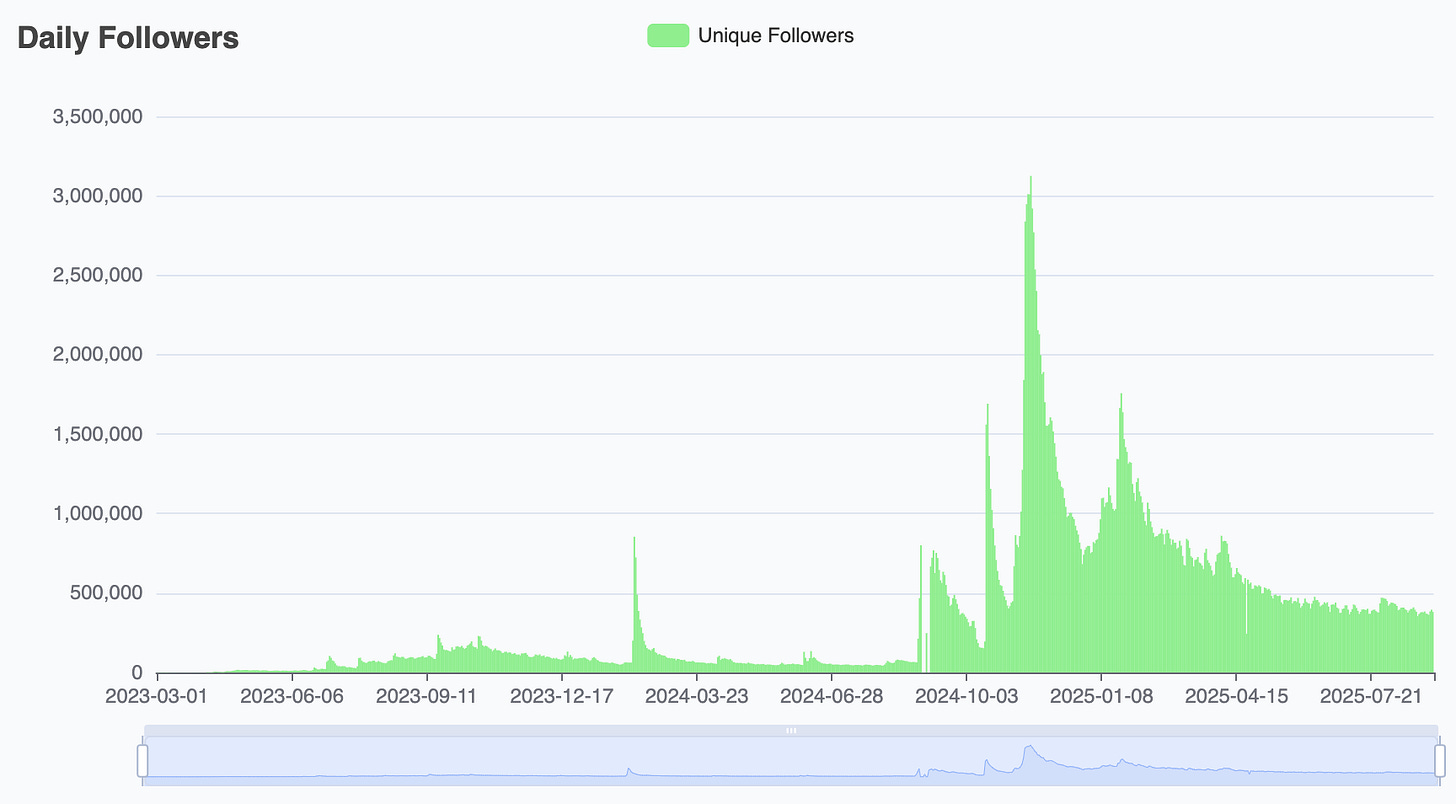

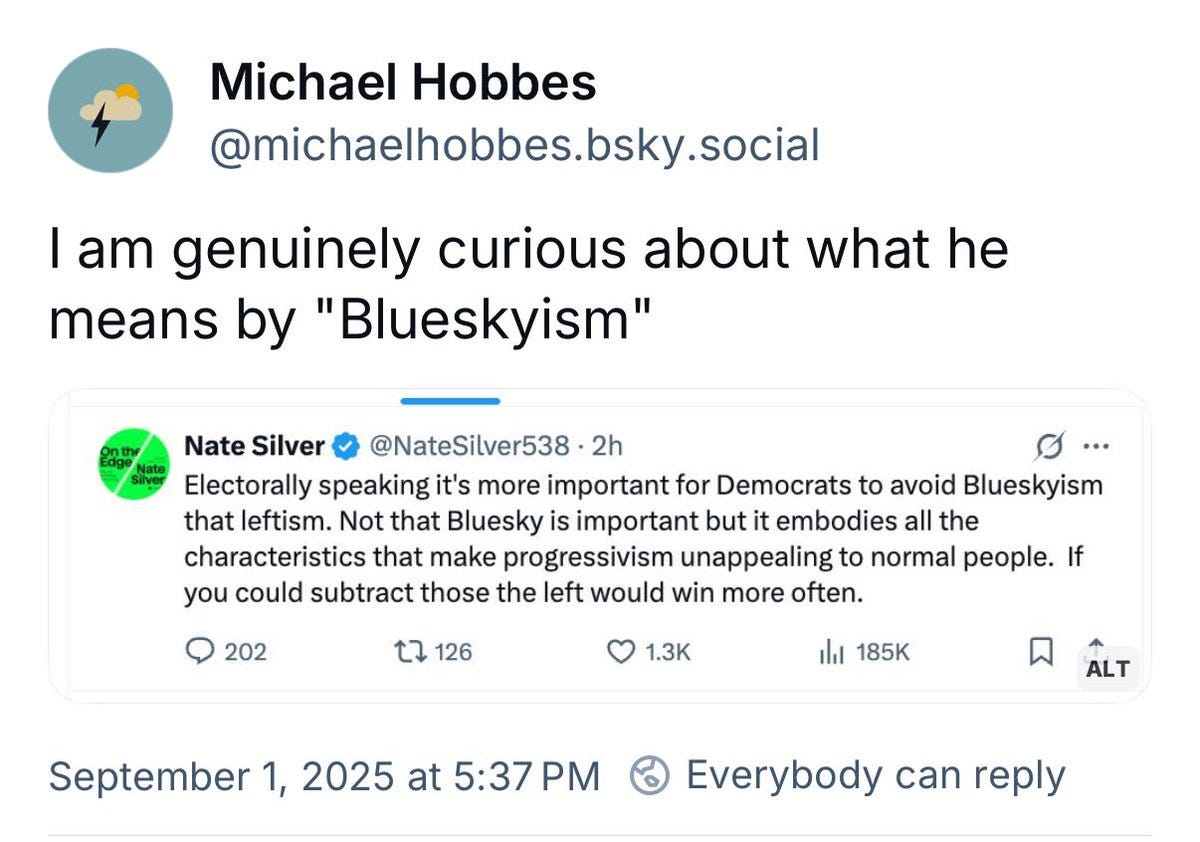
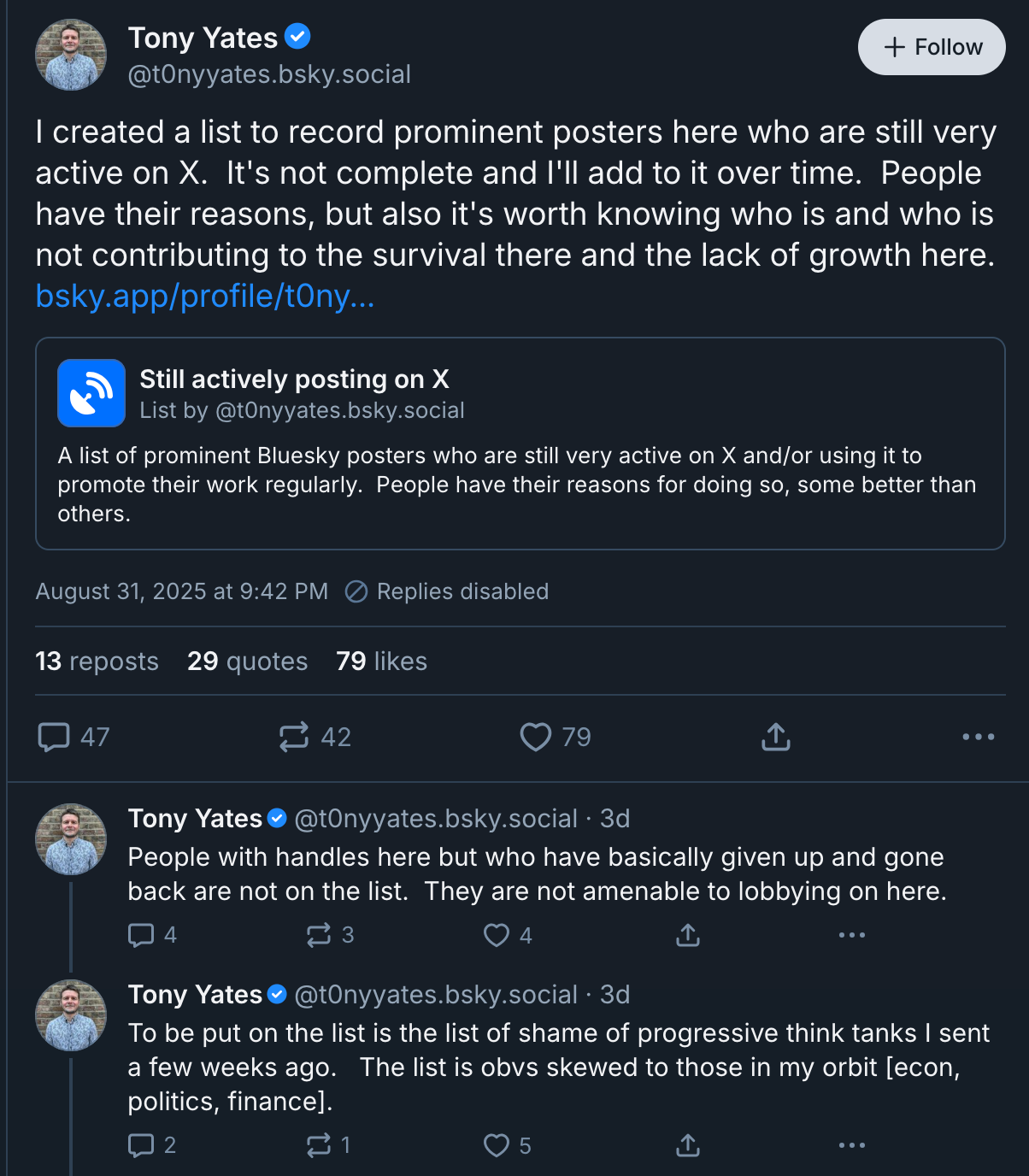

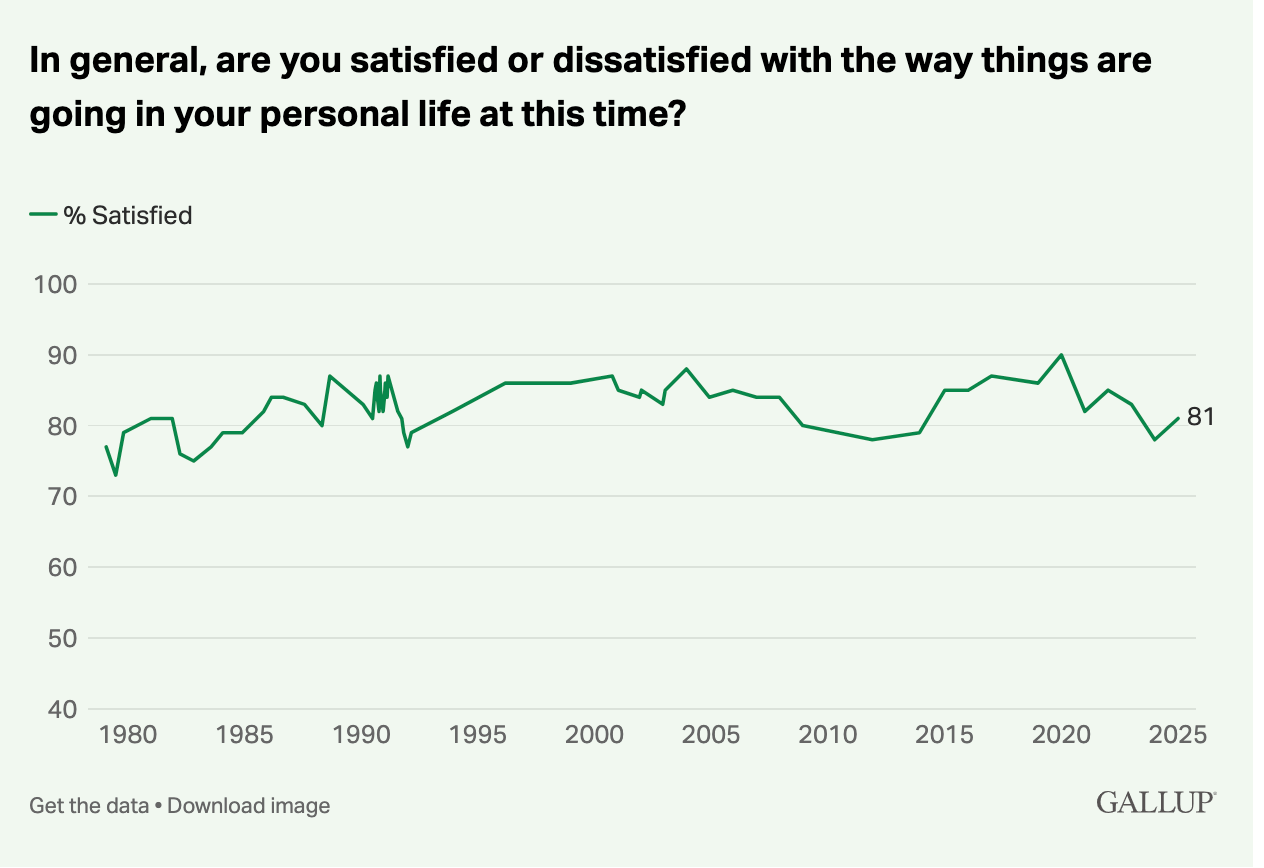
John Oliver’s show is Blueskyism in television form (albeit with some genuinely funny humor sprinkled in)
Nate touches on this a little bit, but I’d hypothesize that Covid was rocket fuel for Blueskyism.
Suddenly there was massive demand for just the kind of “expertise”, extreme takes, doomerism the current Bluesky folks specialize in.
Even if you didn’t follow Taylor Lorenz, one of your overnight-sensation public health “expert” follows was probably retweeting her into your feed. Massive amplification ensued.